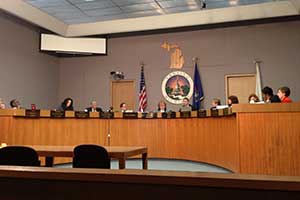The fact that it was nine in the morning on Friday, the last day of the conference, did not stop the Council/Manager Relationships session from being standing-room-only. Managers, mayors, councilmembers, and other staff gathered to hear from experts and peers on how to have a positive working relationship between the manager and council.
William Mathewson, General Counsel for the League, gave a short introduction to the council/manager form of government. He highlighted the adaptability of this form, and how communities can and have structured relationships in their own way. Mathewson emphasized the essential characteristics of each role and how together they combine strong political leadership with professional experience to create an ideal team.
The points of tension, process, and structure were discussed during the panel portion of the session. The overall theme from the panelists was to respect the system that your community has and communicate through the proper channels. Steven Baker, councilmember from Berkley, Mayor Nathan Triplett from East Lansing, and Myron Frasier, councilmember from Southfield, served on the panel moderated by Larry Nielsen, village manager of Paw Paw.
The panel tackled the contentious issue of access to community staff first. Councilman Baker advised working with and through the manager to keep the flow of ideas and information going both ways, without overburdening the staff and putting them in an awkward position between the manager and the council. Mayor Triplett echoed the same sentiments and acknowledged the added public pressure of being the spokesperson for the community. He suggested setting up clear and consistent communication with the manager. Councilman Frasier illustrated the fine line between reporting an issue and overstepping the legislative role of the council. This line was further clarified in a discussion of whether councilmembers should be directly involved in union negotiations. The opinion of the panel was that the council, as a legislative body, should set the guidelines, but the manager and staff alone should be at the bargaining table.
The panelists advocated education and inclusive planning to eliminate controversy with newly-elected officials, both among councilmembers and with the community staff. A strong education process was recommended, through the League’s Elected Officials Academy, annual strategic planning processes, staff orientation to the budget, charter, and organizational goals, and placement on subcommittees. By making the newly-elected official aware of existing boundaries and feeling a part of the direction of the community moving forward, consensus can be built and contention avoided.
Village Manager Nielsen brought up the manager evaluation process as an important part of the council/manager relationship. The key pieces of advice from the panel included allowing the manager to decide if the evaluation is to be done in open or closed session, making sure the manager is aware of the criteria that he or she will be evaluated on, and being consistent with timing of evaluations. Following that advice demonstrates respect for the profession and fairness in rating job performance. The panelists also strongly cautioned against a quantitative rating system and suggested upholding confidentiality when possible.
Communication and mutual respect are key to any relationship, including the council/manager relationship. The panelists and experts felt that by establishing clear goals and guidelines for the community and governance, and maintaining consistency in orientation and evaluation, that strong relationships are built and the council/manager form of government can operate smoothly.
~Jessica Reed

